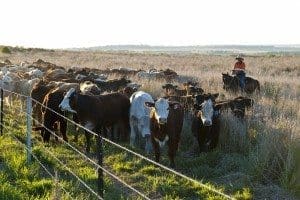WHILE it’s long been said “you are what you eat,” a team of animal scientists in the US is taking an in-depth look at whether a beast’s genetics influences the make-up and performance of its rumen bacteria.
 Assistant professor and microbiologist in the University of Tennessee’s Institute of Agriculture Department of Animal Science, Phillip Myer, is leading a study to determine how the rumen, the largest compartment of the cattle stomach, and the microbes that inhabit it affect the conversion of low-quality feedstuffs into usable energy for ruminants.
Assistant professor and microbiologist in the University of Tennessee’s Institute of Agriculture Department of Animal Science, Phillip Myer, is leading a study to determine how the rumen, the largest compartment of the cattle stomach, and the microbes that inhabit it affect the conversion of low-quality feedstuffs into usable energy for ruminants.
Funded by the USDA National Institute of Food and Agriculture, the US$500,000 study seeks to identify whether the genetics of a particular cow influences the rumen microbiome and whether that influence can be passed on to future generations.
The overarching hypothesis of the project was that host beef cattle genetics are associated with the variation of microbes in the rumen, producing an individualised rumen microbiota among animals, Prof Myer said.
He believes that if certain microbes are significant for feed efficiency, disease resistance, and other desirable production traits in cattle, then ruminal microbes represent the greatest opportunity to rapidly improve beef cattle nutrition and influence growth to help producers meet future global protein demands.
Specifically, the three-year project seeks to determine the microbes and microbial interactions in the rumen of Angus cattle as well as the microbes’ relation to feed efficiency. The scientists involved, including Jonathan Beever, director of the UTIA Genomics Centre for Advancement of Agriculture; Brynn Voy, also a professor in the UT Department of Animal Science; and Larry Kuehn and James Wells, both with the USDA US Meat Animal Research Centre – are also seeking to estimate the heritability of the rumen microbes and microbial features and to identify host genomic markers that ensure heritability.
The goal is microbiome manipulation to enhance agricultural production, Prof Myer said.
“This project will ultimately provide a means to increase food availability while lowering environmental impacts, develop more sustainable cow-calf production systems, and enhance Angus breeding programs,” he said.
The research grant was one of 23 that the US National Institute of Food and Agriculture announced last month that should lead to better management strategies for animal production systems, enhance production efficiency, and further develop high quality animal products for human use. Each of the grants was part of NIFA’s Agriculture and Food Research Initiative.
Source: University of Tennessee Institute of Agriculture

I carry on listening to the reports talk about getting free online grant applications so I have been looking around for the best site to get one. Could you tell me please, where could i acquire some?
I would like to receive information
The differences in rumen bacteria has been proven…….long ago……..to have a strong genetic basis. Email if you want more info…….graybull@beefpower.com